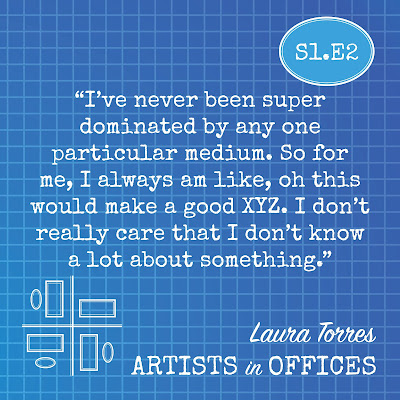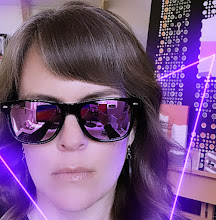The podcast has launched! I released the trailer and website last Monday, followed by the first five episodes, plus one bonus mini episode, on Wednesday, May 1st (May Day!). At this time, you can listen to the trailer, the first six full episodes, plus two bonus mini episodes at artistsinoffices.com or wherever you get your podcasts (subscribe on iTunes, Google Play, Stitcher, etc.). I have four more episodes to release over the next month, plus a couple of updates later this summer with the two artists who've since quit their day jobs to focus more time on their creative practice and/or move cross-country!
This may be one of the first big projects I've ever actually finished. A friend told me last week, "you're the first person I know to say they're doing a podcast and then actually do it." As a creative person who struggles to focus on one project through completion, I took that as a huge compliment. And I'm pretty happy with how it's turned out so far. Am I an expert in podcasting? Hardly. But I have learned a few things along the way. In the spirit of reflection and transparency, I wanted to jot them down here.
The idea came 3-4 years ago from using the hashtag #artistsinoffices for the occasional social media post while working at my last day job. It was perhaps the first place I worked where I was surrounded by other "artists in offices" living this dual life. The difference, since we were many, was that, for the first time in my professional career outside of teaching art, of course, I didn't feel like that other part of my life had to be kept a secret! I had this desire to tap into that community in some way - have "standing meetings" where we actually talk about our studio practice, or start a support group that meets over pancakes once a month. But the reality was we were all super busy; having that conversation in any kind of meaningful way was challenging. Add studio time and, y'know, life to a demanding, full-time job and the occasional grueling commute to and from San Francisco, even if your primary office was on the Oakland campus, and you're not left with much time to spare. In my case, with a couple of kids on top of that, there was simply no time or energy to devote to exploring this idea. Ironically, I had to quit my day job in order to pursue any kind of project about how artists juggle their studio practice with their day jobs!
I wouldn't be able to do this without the support - both financial and otherwise - of my husband, but I will say I spend at least half of the traditional work week, and all school breaks (that's 14+ weeks a year, folks), plus sick days, random days off, minimum days, field trips, etc., wrangling two young kids and managing the household (we do outsource yard work but that's about it). It's way more time than I had when working - and it's probably more time than the artists I interview have, though none of them have kids - but I didn't work on this full-time. I think now that I kind of know what I'm doing and I have my structures and systems in place, especially if I did not have kids, I could probably do this alongside a day job. Maybe.
But backing up a bit, where did I go from initial idea? Well, as with most ideas, I sat on it for a long time. When I quit my day job in August 2017, it was included in a very long list of projects I wanted to tackle that academic year. In the middle of my first year of unemployment-by-choice, I used part of a holiday gift card (one of those Visa gift cards you can use anywhere) to pay for a one-day workshop called "Podcasting: Narrative & Tech for Beginners" offered in the Grad Writing Program at CCA, taught by Julia Scott, an Oakland-based journalist who also does radio pieces for KQED and elsewhere. That was a game-changer. Podcasting now is like blogging was fifteen years ago. The impression I had was that anyone can do it. But it takes practice and financial resources to do it well. I took several pages of notes at that workshop and it propelled me to think more seriously about what my podcast would be about, who I would interview, what I would ask them, and what I needed to pull this off.
But I was also struggling at the time with the studio reboot portion of my decision to quit my day job while writing a screenplay, so I didn't act much on this idea for the rest of that school year. Then came 10 weeks of summer "break". Last fall, when the kids went back to school, I dusted off the idea and started half-heartedly reaching out to the artists I wanted to interview. Half-heartedly because I felt like I couldn't really justify spending any money on this project if I wasn't bringing in any income. Enter anonymous donor (executive producer?), who offered to buy all the equipment on my Amazon wish list - about $200 worth! It felt weird to accept this generous patronage, but it also felt foolish to turn it down. And having someone support a project financially provides for some accountability I wasn't really feeling otherwise, as much as I wanted to do it. I got to work in November, and that accountability factor - the pressure I felt to do this thing and do it well - gained momentum with each interview I completed.
From November 2018 to early March 2019 I interviewed ten artists - five here in the Bay Area, and five elsewhere. Local artists I interviewed in-person, in their studios. Artists in Northern California, Southern California, Chicago, and New York I interviewed via Skype. It was the best solution I researched for recording audio for free. The audio could certainly be better on a couple of interviews, so this is something I might look into and throw some money at moving forward, but overall I'm satisfied with the audio quality in the finished episodes.
On my end, in addition to my microphones and pop filter, I made this little DIY recording studio that I put on my desk when I'm recording an interview or tracking for finished episodes. In the workshop, we went over using Audacity, because it's free. And I'm all for free but I just couldn't get the hang of it. Since I already pay for Adobe Creative Suite each month, I downloaded Audition and did a practice faux-cast with my son about Fortnite just to kind of familiarize myself with my equipment, using Audition for sound editing, even adding in some music and sound effects, and exporting an MP3 that I could upload to SoundCloud. Music for the podcast, I should add, is provided by my friend and fellow creative person with a day job (and kids!), Mr. Neat Beats.
For hosting, I use libsyn. Their interface looks and feels adorably dated but it's fairly intuitive. And I believe they're one of the older hosting platforms, so I felt like I could trust that reputation. The couple of times I've had to reach out for customer support the response has been very quick and helpful. I submitted my trailer to iTunes about a week before launch. They warn it can take up to two weeks for your podcast to be approved (you only need one episode so it's helpful to submit even if you're not ready to launch, if you want to launch on a specific day; you don't need to go public with whatever you submit, and you can always delete or edit it after the fact). It only ended up taking a couple of days, but I just happened to submit my podcast in a period of a few days where the platform to do so was experiencing two different login bugs. That was super frustrating but in the end I was able to get it approved in time for my May 1st launch. Sharing the podcast on social media, of course, has been a part-time job ever since!
Did I miss anything? Feel free to ask questions or provide feedback in the comments. And listen to the podcast if you haven't already - leave me a rating or review on iTunes, won't you? You can follow the project on Instagram and Twitter, and join the Facebook group if you're so inclined. And, hey, if you're local and into that whole meet over pancakes idea, hit me up!





